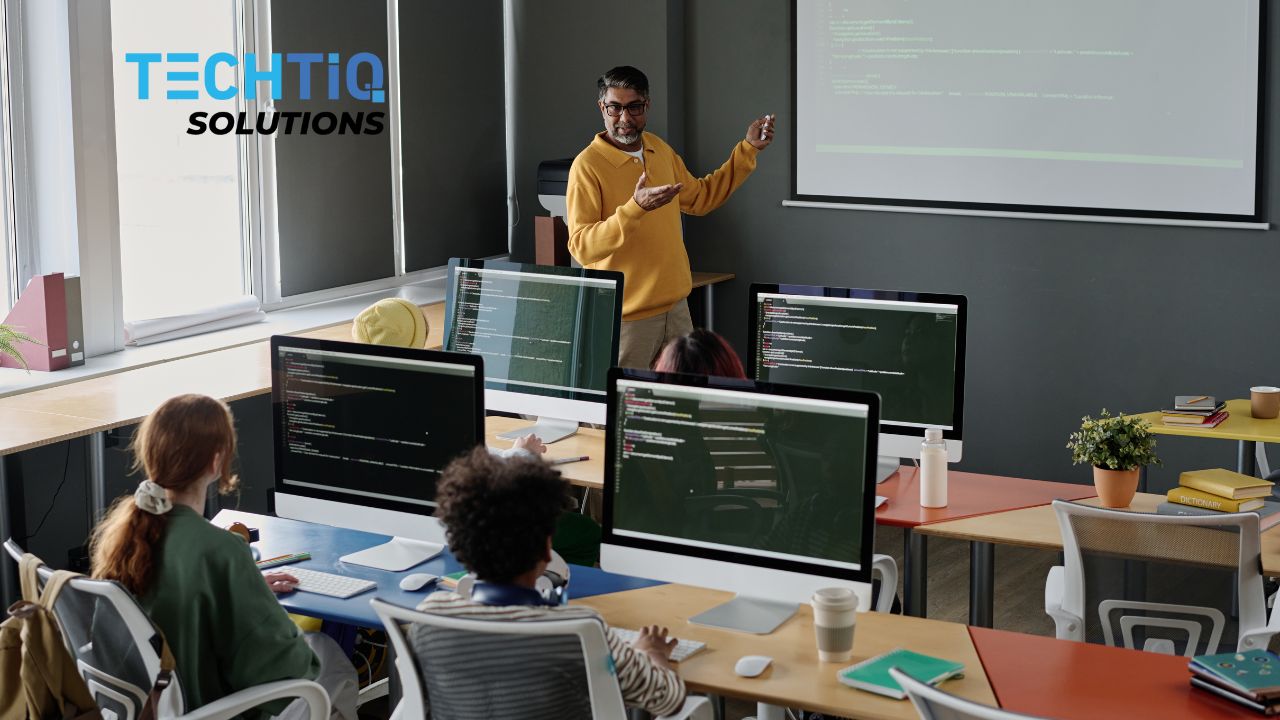Ever wondered how those immersive games and interactive 3D experiences are created? Behind the captivating graphics and seamless gameplay lies a powerful engine – Unity.
As Singapore continues to establish itself as a tech hub in Southeast Asia, Unity software development has become increasingly important for businesses looking to create engaging digital experiences.
Key Takeaways
-
Unity is a versatile cross-platform game engine used for game development, simulations, AR/VR applications, and enterprise solutions in Singapore
-
Singapore’s software development market is projected to reach USD 42.26 billion by 2030, according to IndustryARC
-
Government initiatives like the Smart Nation program and various funding opportunities support the growth of Unity development in Singapore
-
Professionals in Unity development can earn between S$62,580 to S$187,740 annually depending on experience level, as reported by Jobicy
-
TechTIQ Solutions offers comprehensive Unity development services, bringing expertise in creating custom interactive experiences across various industries
What is Unity Software Development?
Unity software development refers to the process of creating applications and interactive experiences using the Unity game engine. While originally designed for game development, Unity has evolved into a versatile platform used for various applications including simulations, architectural visualizations, film production, automotive design, and more.
Understanding the Unity Game Engine
At its core, Unity is a cross-platform game engine developed by Unity Technologies. First released in 2005, it has grown to become one of the most widely used engines for creating interactive 2D and 3D content. What makes Unity stand out is its ability to deploy projects across multiple platforms including mobile devices, desktop computers, consoles, and VR/AR headsets with minimal code changes.
POWER STAT: Unity powers more than 50% of all mobile games and has been used to create applications that have been installed on over 3 billion devices worldwide.
The engine uses C# as its primary programming language, employing a component-based architecture where developers can attach various components to game objects to define their behavior and properties. This modular approach makes Unity accessible to beginners while offering depth for experienced developers.
But that’s not all – Unity’s editor provides a visual interface for designing scenes, manipulating objects, and testing gameplay, alongside tools for animation, physics simulation, lighting, and audio management. This integrated environment streamlines the development process and enables rapid prototyping.
Key Features and Capabilities
Unity offers a rich set of features that make it a powerful choice for developers:
-
Cross-platform deployment: Build once and deploy to over 25 platforms including iOS, Android, PC, Mac, consoles, AR/VR devices, and web browsers
-
Real-time rendering: Create visually stunning 3D and 2D visuals with high-performance rendering capabilities
-
Physics engine: Implement realistic physical interactions with built-in physics systems
-
Animation tools: Design smooth character animations and environmental effects
-
Visual scripting: Create game logic without traditional coding using visual scripting systems, as explained by PubNub
-
Asset store: Access thousands of pre-made assets, tools, and plugins to accelerate development
-
Multiplayer and networking: Build real-time multiplayer experiences with Unity’s networking capabilities
Here’s where it gets interesting – Unity 6, set to release in fall 2024, promises significant improvements including enhanced speed and runtime performance, enabling developers to create larger and more complex scenes, develop multiplatform games directly within the editor, and create dynamic AI and XR experiences, according to Unity’s investor reports.
Applications Beyond Gaming
While Unity is renowned for game development, its applications extend far beyond entertainment:
-
Architecture and Construction: Interactive 3D models and walkthroughs of buildings before construction
-
Automotive: Virtual showrooms and configurators for vehicles
-
Healthcare: Medical simulations and training programs
-
Education: Interactive learning experiences and educational games
-
Film and Animation: Virtual production tools and real-time rendering for filmmakers
-
Military and Defense: Training simulations and scenario planning
-
Marketing: Interactive product demonstrations and branded experiences
This versatility has made Unity a valuable tool for businesses across various industries in Singapore looking to embrace interactive digital experiences.
The Unity Software Development Landscape in Singapore
Singapore has emerged as a hub for technology and innovation in Southeast Asia, with Unity development playing a significant role in its digital ecosystem.
Industry Growth and Market Size
Singapore’s software development market is on a trajectory of substantial growth, with projections indicating it will reach USD 42.26 billion by 2030, expanding at a compound annual growth rate (CAGR) of 5.1% from 2024 to 2030, according to IndustryARC. This growth is driven by a robust digital infrastructure, government support, and a skilled talent pool.
POWER STAT: The video game market in Singapore is projected to reach US$431.60 million by 2027, with a user penetration rate of 46.5% – nearly half of Singapore’s population will be gamers.
The video game market in Singapore specifically is experiencing remarkable expansion, as reported by IdeaUsher. This provides a fertile ground for Unity developers to create engaging and innovative interactive experiences.
You might be wondering – what’s driving this rapid expansion? The answer lies in Singapore’s strategic positioning, technological infrastructure, and supportive ecosystem for developers.
Key Players and Studios
Singapore’s Unity software development landscape features a diverse array of players:
-
Established Studios: Companies like Bandai Namco Studio, Swag Soft, LambdaMu Games, and Binacle have established themselves as leaders in innovative game design and development, according to voffice.com.sg.
-
Global Companies: International giants such as Ubisoft and Riot Games have established a presence in Singapore, contributing to the growth of the local gaming ecosystem and bringing global expertise to the market, as noted by IdeaUsher.
-
Indie Developers: Emerging indie studios like Boomzap Entertainment and Lionfish Studios are injecting fresh ideas and creativity into the industry, often developing unique niche games.
-
Technology Companies: Companies specializing in tailored digital solutions offer comprehensive software development services leveraging Unity for various applications beyond gaming, including enterprise solutions, simulations, and interactive experiences, as highlighted by Saigon Technology.
Government Support and Initiatives
The Singaporean government has implemented numerous initiatives to support the growth of the technology and gaming sectors:
-
Smart Nation Initiative: This program aims to transform Singapore into a digitally-enabled nation, creating economic opportunities and improving public services through technology, according to GovTech.
-
Funding Programs: The government has set aside approximately SG$24 billion (US$18.1 billion) over three years to help local businesses innovate and build capabilities in emerging technologies. For startups improving existing technologies, the government provides 70% of the funding in an initial investment round of S$250,000, and thereafter matches private investments dollar for dollar up to a cap of S$2 million, as reported by IndustryARC.
POWER STAT: Singapore’s government provides up to 70% of initial funding (S$250,000) for tech startups, making it one of the most supportive environments for Unity developers in Southeast Asia.
-
AI Integration: Singapore is actively promoting the integration of AI in various sectors, including game development. Unity is incorporating AI-powered tools for content creation, animation, and game design evaluation, as evidenced by the development of Unity Muse, an AI-powered platform designed to accelerate real-time 3D and game development, according to Unity’s investor reports.
-
Education Initiatives: Programs like Code for Fun expose students to coding and digital making, equipping them with essential skills for the digital future and fostering an interest in technology from a young age, as highlighted by GovTech.
These initiatives create a supportive environment for Unity developers in Singapore, providing resources, funding, and opportunities for growth and innovation.
Essential Skills for Unity Developers in Singapore
Success in Unity development requires a combination of technical skills, creativity, and industry knowledge. Let’s dive into what it takes to excel in this field.
Technical Skills
-
C# Scripting: Proficiency in C# is essential as it’s the primary scripting language used in Unity development. Understanding object-oriented programming concepts is crucial for creating efficient and maintainable code.
-
3D Modeling and Animation: Knowledge of 3D modeling software like Blender, Maya, or Max helps in creating or modifying assets for Unity projects. Understanding animation principles is also valuable for creating dynamic and engaging experiences.
-
Shader Programming: Skills in writing custom shaders can significantly enhance the visual quality of Unity projects, allowing for unique visual effects and optimizations.
-
Game Physics: Understanding how to implement and fine-tune physics interactions within Unity is crucial for creating realistic and responsive experiences.
-
Particle Systems: Mastery of Unity’s particle system for creating effects like fire, smoke, and explosions adds visual polish to games and simulations.
-
AR/VR Development: With the growing popularity of immersive technologies, skills in augmented reality and virtual reality development using Unity are increasingly valuable in the Singapore market.
-
Performance Optimization: Knowledge of optimization techniques is crucial for ensuring smooth performance across different devices and platforms.
But here’s what separates good Unity developers from great ones – the ability to combine these technical skills with creative problem-solving and industry knowledge.
Soft Skills and Industry Knowledge
Beyond technical abilities, successful Unity developers in Singapore should possess:
-
Problem-solving: The ability to troubleshoot issues and find creative solutions to technical challenges.
-
Game Mechanics Design: Understanding how to create engaging and balanced gameplay systems that keep users interested.
-
Level Design: Skills in creating well-paced, interesting environments and challenges for players to navigate.
-
Interactive Storytelling: The ability to weave narratives into interactive experiences enhances user engagement.
-
User Experience Design: Creating intuitive interfaces and seamless interactions is essential for successful Unity applications.
-
Communication: Effective communication skills are essential for collaborating with team members and understanding client requirements.
-
Project Management: Understanding of game development lifecycles and project management methodologies helps in delivering projects on time and within budget.
-
Industry Awareness: Keeping up with the latest trends, technologies, and best practices in Unity development and the broader gaming industry.
Education and Training Opportunities
Singapore offers various pathways for aspiring Unity developers to acquire the necessary skills:
-
University Programs: Institutions like Singapore Management University offer the Advanced Certificate in Unity Product Design and Development, providing comprehensive training in Unity and its applications, as noted on SMU Academy’s website.
-
Bootcamps: The Unity Game Development Bootcamp provides hands-on experience in Unity and C# programming for secondary school and junior college students, according to Tinkercademy.
-
Certified Courses: Organizations like NTUC LearningHub offer WSQ-certified Unity developer courses covering programming, artistry, and VR development, as detailed on NTUC LearningHub’s website.
-
Online Resources: Platforms like Unity Learn and various MOOCs provide flexible learning options for individuals at different skill levels.
-
Industry Workshops: Regular workshops and masterclasses conducted by industry professionals offer practical insights and networking opportunities.
These educational pathways ensure a steady pipeline of skilled Unity developers in Singapore, contributing to the growth and innovation in the field.
Challenges and Opportunities in Unity Development
The Unity development landscape in Singapore presents both significant challenges and exciting opportunities. Let’s explore what developers and businesses should be aware of.
Common Challenges
-
Competition: The global gaming industry is fiercely competitive, requiring Singaporean developers to innovate and differentiate themselves in a crowded market, as observed by Kavout.
-
Talent Acquisition: Attracting and retaining skilled Unity developers can be challenging, with competition from larger companies and other technology sectors, as highlighted by IdeaUsher.
-
Rapid Technological Changes: The fast-paced evolution of technology requires continuous learning and adaptation to stay relevant.
-
Cost of Development: Game development, particularly for complex projects, can be expensive, requiring careful budgeting and resource management, according to IdeaUsher.
-
Market Volatility: The gaming market can be unpredictable, with changing user preferences and monetization models.
But here’s the exciting part – with these challenges come substantial opportunities for those who can navigate them effectively.
Emerging Opportunities
-
AR/VR Expansion: Singapore’s focus on immersive technologies presents significant opportunities for Unity developers to create cutting-edge augmented reality and virtual reality applications.
-
Digital Twin Development: The growing adoption of digital twin technology for simulating real-world systems creates new opportunities for Unity developers in Singapore.
-
Educational Technology: Unity’s interactive capabilities make it ideal for developing educational applications, a sector experiencing significant growth in Singapore.
-
Healthcare Applications: The healthcare industry increasingly uses simulations for training and therapeutic purposes, creating demand for specialized Unity development.
-
Regional Hub Advantage: Singapore’s position as a regional technology hub attracts international collaborations and investment, expanding opportunities for local developers, as noted by IdeaUsher.
Future Trends
Looking ahead, several trends are shaping the future of Unity development in Singapore:
-
AI Integration: Artificial intelligence is increasingly being integrated into Unity development, both as a tool for developers and as a feature in applications, according to Kavout.
-
Cloud Gaming: With improving internet infrastructure, cloud gaming is expected to gain traction, offering new distribution channels for Unity-developed games, as highlighted by IdeaUsher.
-
Metaverse Development: The concept of the metaverse is driving demand for interconnected 3D environments, an area where Unity developers have significant expertise.
-
Procedural Generation: Advanced techniques for automatically generating content are becoming increasingly important for creating large-scale virtual worlds efficiently.
-
Real-time 3D Collaboration: Tools for real-time collaboration in 3D environments are becoming essential for remote teams working on Unity projects.
POWER STAT: Singapore has allocated $30 million to its Green Computing Funding Initiative, creating new opportunities for energy-efficient Unity development practices.
-
Sustainable Development: Green computing practices are becoming more important, with initiatives like Singapore’s Green Computing Funding Initiative allocating $30 million to promote research and development of energy-efficient software solutions, as reported by IMDA.
-
Cross-Industry Applications: Unity’s versatility will continue to drive its adoption across various industries beyond gaming, creating diverse opportunities for developers.
Hiring Unity Developers in Singapore
For businesses looking to leverage Unity for their projects, understanding the hiring landscape is essential.
Salary Expectations
The salary range for Unity developers in Singapore varies based on experience and expertise:
-
Junior Developers (0-2 years experience): S$62,580 – S$83,440 annually
-
Mid-level Developers (3-5 years experience): S$90,000 – S$120,000 annually
-
Senior Developers (6+ years experience): S$125,160 – S$187,740 annually
These figures are based on industry salary surveys and job market reports, as compiled by Jobicy, and can vary based on specific skills, project complexity, and the employer’s size and industry.
Job Market Overview
The demand for Unity developers in Singapore is strong, reflected in the variety of available roles:
-
Game Developer/Programmer: Focus on implementing game mechanics and features
-
AR/VR Developer: Specializing in immersive technology applications
-
Technical Artist: Bridging the gap between art and programming
-
UI/UX Designer for 3D Applications: Creating intuitive interfaces for 3D experiences
-
Unity Full-Stack Developer: Handling both front-end and back-end aspects of Unity applications
The job market is particularly favorable for developers with experience in emerging areas like AR/VR, AI integration, and cross-platform development, with opportunities available at companies such as Unity Technologies itself, according to their careers page.
Finding the Right Talent
For companies looking to hire Unity developers in Singapore, several approaches can be effective:
-
Partner with Specialized Agencies: Technology staffing agencies like TechTIQ Solutions can help identify and recruit qualified Unity developers.
-
Leverage Educational Institutions: Building relationships with universities and coding bootcamps can provide access to emerging talent.
-
Attend Industry Events: Game development conferences and tech meetups are excellent venues for networking with potential candidates.
-
Consider Remote Options: Expanding the search to include remote developers can widen the talent pool while still maintaining Singapore as the operational base.
-
Invest in Training: Upskilling existing development team members in Unity can be a cost-effective approach to building internal capabilities.
Getting Started with Unity Development in Singapore
For individuals interested in pursuing Unity development in Singapore, several resources and steps can help launch a successful career.
Resources and Communities
-
Singapore Games Guild: A community of game developers in Singapore providing networking and knowledge-sharing opportunities.
-
Unity User Groups: Regular meetups focused specifically on Unity development, offering workshops and discussions.
-
SGGA (Singapore Games Association): The trade association for Singapore’s games and esports industry, providing resources and support for game developers.
-
Online Forums and Communities: Platforms like Unity Forums, Stack Overflow, and Reddit’s Unity communities offer valuable support and knowledge sharing.
-
Local Game Jams: Regular game jams in Singapore provide opportunities to practice skills, network, and build portfolio projects.
First Steps for Beginners
-
Learn C# Fundamentals: Start with the basics of C# programming, as this forms the foundation of Unity development.
Complete Official Tutorials: Unity offers comprehensive tutorials for beginners on their learning platform. -
Start Small Projects: Begin with simple games or applications to apply newly learned concepts.
-
Join Collaborative Projects: Participating in team projects can provide valuable experience and portfolio pieces.
-
Take Advantage of Free Resources: Unity offers a personal free license that provides access to most features needed for learning and small projects.
Building Your Portfolio
-
Diversify Your Projects: Include different types of applications or games to demonstrate versatility.
-
Document Your Process: Include case studies explaining your role, challenges faced, and solutions implemented.
Contribute to Open Source: Participating in open-source Unity projects can demonstrate collaboration skills and provide additional experience. -
Showcase Technical Skills: Highlight specific technical achievements like optimization, innovative gameplay mechanics, or integration with other technologies.
-
Maintain an Online Presence: Share your work on platforms like GitHub, personal websites, or social media dedicated to game development.
Unity vs. Unreal Engine in Singapore
One of the most common questions for developers in Singapore is whether to choose Unity or Unreal Engine for their projects. Let’s compare these two popular engines in the context of Singapore’s development environment.
Performance and Graphics
Unity:
-
Excellent performance across a wide range of hardware
-
Good graphics capabilities with Universal Render Pipeline (URP) and High Definition Render Pipeline (HDRP)
-
Optimized for mobile development, which aligns well with Singapore’s high mobile usage
Unreal Engine:
-
Superior graphics capabilities out of the box
-
More demanding on hardware resources
-
Better suited for high-end PC, console, and VR experiences
-
Recent mobile optimization has improved performance on smartphones
Ease of Learning and Development
Unity:
-
Lower barrier to entry with C# as the scripting language
-
Extensive documentation and learning resources
-
More intuitive editor for beginners
-
Shorter development cycles for simpler projects
Unreal Engine:
-
Steeper learning curve with C++ as the primary language
-
Visual scripting through Blueprints system helps non-programmers
-
More complex editor with additional features
-
Better suited for larger teams and more complex projects
Market Relevance in Singapore
Unity:
-
More widely used in Singapore’s mobile-focused market
-
Better aligned with local educational programs
-
Larger community of developers in Singapore
-
More job opportunities for Unity developers in the region
Unreal Engine:
-
Growing adoption for high-end games and enterprise applications
-
Increasing demand in Singapore’s emerging AAA game development scene
-
Preferred for architectural visualization projects
-
Strong in film and television production uses
Cost Considerations
Unity:
-
Free personal license for individuals and small companies (revenue under $100K)
-
Unity Pro at $1,800/year per seat
-
5% royalty on games making over $200K in revenue
Unreal Engine:
-
Free until the product reaches $1 million in revenue
-
5% royalty on revenue above $1 million
-
More favorable for startups and indie developers in Singapore’s ecosystem
For many developers in Singapore, Unity remains the more practical choice due to its lower barrier to entry, mobile optimization, and larger local community. However, Unreal Engine is gaining traction for specific use cases where visual fidelity is paramount.
Conclusion
Unity software development in Singapore represents a dynamic and growing field with applications spanning gaming, enterprise solutions, education, healthcare, and more. The supportive ecosystem, including government initiatives, educational opportunities, and a thriving technology community, positions Singapore as an ideal location for Unity development.
Whether you’re a business looking to leverage Unity for your next project or an individual pursuing a career in Unity development, Singapore offers abundant opportunities and resources. As technologies like AR/VR, AI, and the metaverse continue to evolve, Unity developers in Singapore are well-positioned to lead innovation and create impactful interactive experiences.
Ready to harness the power of Unity for your next project? TechTIQ Solutions offers comprehensive Unity development services, bringing expertise in creating custom interactive experiences across various industries. Our team specializing in robust business applications combines technical proficiency with creative problem-solving to deliver solutions that exceed expectations.
Contact us today to discuss how we can help bring your vision to life through Unity:
-
Email: inquiry@techtiqsolutions.com
-
Phone: (+65) 8898 2997
-
Address: 28 Sin Ming Lane #02-145, Midview city, Singapore 573972
Frequently Asked Questions
How long does it take to develop a game with Unity in Singapore?
Development timelines vary significantly based on project complexity, scope, and team size. Simple mobile games might take 3-6 months, while more complex games can require 1-2 years or more. Working with an experienced Unity development team in Singapore can help optimize timelines through efficient processes and appropriate resource allocation.
What are the costs associated with Unity development projects?
Unity development costs in Singapore depend on project scope, complexity, and the development team’s expertise. Small to medium projects typically range from S$20,000 to S$150,000, while larger or more complex projects can exceed S$300,000. Factors affecting cost include design complexity, number of platforms, multiplayer features, and custom asset requirements.
Is Unity suitable for non-gaming applications in Singapore?
Absolutely. While Unity began as a game engine, it has evolved into a versatile platform for various applications. In Singapore, Unity is increasingly used for architectural visualization, virtual training, medical simulations, automotive design, marketing applications, and educational tools. Its real-time 3D capabilities make it ideal for any application that benefits from interactive visualization.
How does Unity compare to other game engines for development in Singapore?
Unity offers several advantages for development in Singapore: a lower learning curve compared to Unreal Engine, excellent cross-platform support, a large asset store, and strong community support. While Unreal Engine might offer superior graphics for AAA-quality games, Unity’s versatility, extensive documentation, and widespread adoption make it particularly well-suited for Singapore’s diverse development needs and growing mobile market.
What kind of team is needed for a successful Unity development project?
A well-rounded Unity development team typically includes:
-
Unity developers/programmers with C# expertise
-
3D artists and animators
-
UI/UX designers
-
Game designers (for game projects)
-
Sound designers/composers
-
QA testers
-
Project manager
For smaller projects, team members may wear multiple hats, while larger projects benefit from specialists. In Singapore’s collaborative development environment, having team members with cross-functional skills can be particularly valuable.
Meta Title: Unity Software Development in Singapore: Comprehensive Guide 2025
Meta Description: Explore Unity software development in Singapore with expert insights on market trends, skills, opportunities, and best practices for game and interactive experiences development.









